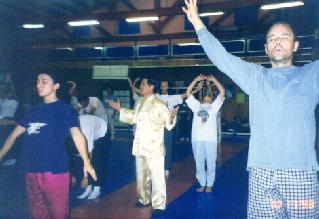SWAYING IN CHI FLOW

A chi kung class
Question
Some years back, I purchased your book, “Chi Kung for Health and Vitality”, and received some great benefit from it for an eye problem. I am very grateful for this.
However, I must have done something quite wrong in the induced or spontaneous qi technique. Whenever I stand in a relaxed posture, I sway. Much of the time I sway forwards, sometimes backwards too, and often with a fair amount of force. So I have to strain myself to avoid falling or tipping over. I'm sure this is not a balance problem — it is obviously that the energy is pushing me forward.
-- Mark, USA
Answer
Firstly, I want to let you know that there is nothing wrong with you. Then I would like to congratulate you for overcoming your eye problem and for the good results with your qigong training on your own.
Your swaying is natural. It is due to two good results brought about by your qigong practice. One, your qi is flowing smoothly and vigorously inside you. Two, you are relaxed.
Qi flow is natural. It occurs in everybody irrespective of whether he does qigong or not. Just like blood flow, qi flow has become so habitual that people are normally unaware of it. But in most people, the qi flow is not smooth and vigorous. The flow is often blocked at many places, where it merely seeps over, and in other places it flows sluggishly.
Secondly, most people are not relaxed. They can be stressful physically, such as caused by muscular tension; emotionally, caused by clinging to negative emotions; mentally, caused by perverse views; or spiritually, caused by depressing the spirit.
If a person is relaxed and allows his qi to flow unrestrictedly, his body will sway. Then, why do people do not sway? It is because they are not relaxed, and they have been so habitual to tension that they may not even be aware of it! At some rare moments they may be relaxed, and their body may start to sway. But as soon as they notice the movement, they tense their back and leg muscles to stop it. This is a common problem we help students to overcome when they first attend our qigong classes.
Question
Whenever I mention this problem to others who are or claim to be qigong adepts, masters, experts, etc., their reply is always the same, “You have a blockage, keep practicing, after a while it will clear up."
Although I did stop doing any qigong for a while, I doubt this problem will ever go away, unless I hit upon some special technique to overcome it.
Answer
It is true that if a person has some blockage, the qi flow generated by his qigong practice may cause him to sway, and if he keeps practicing, after a while, the blockage will be cleared and his sway may stop.
At the surface this statement immediately above seems to contradict my answer to your previous question that if you are relaxed and your qi is flowing smoothly, you will sway. But actually it doesn't. The apparent contradiction is due to the limitation of words to express precise meanings, and in qigong such situations are not uncommon.
An analogy may clear the confusion. Suppose you met a friend at a supermarket, and you said to him, “I come here to buy some household necessities because they have been used up.” The next day you also met the same friend at the supermarket, and you also said, “I come here to buy some household necessities.” Remembering what you had told him the day before, he asked, “Have you already used up the household necessities you bought yesterday?” You can honestly and correctly answer, “No, I still have lots of them.”
In your case, your sway is not due to your qi flow attempting to clear blockage, but due to your qi flowing smoothly and you being relaxed.
You should continue to practice your qigong the way you did. It has given you good results. Your sway is not a deviation or a problem, it is an indication of correct practice. But if it causes you embarrassment in public, or if you want to stop swaying for any good reasons, you just have to tense your leg muscles and the sway will stop. You should then walk about briskly to relax your leg muscles again.
The above is taken from Questions 7 and 8 Dec 2003 Part 3 of the Selection of Questions and Answers.
LINKS
Courses and Classes
